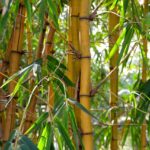Bamboo is often celebrated as one of nature’s most versatile and sustainable materials. With a history spanning thousands of years, this remarkable plant has found applications in various fields, from construction to culinary arts. In this blog post, we’ll explore the myriad uses and benefits of bamboo, making a compelling case for why you should consider incorporating it into your life.
The Incredible Versatility of Bamboo
Bamboo belongs to the grass family and grows in diverse environments, making it one of the fastest-growing plants on Earth. Its unique properties enable it to serve numerous purposes across different sectors. Here are some of the most common uses of bamboo:
1. Construction Material
Bamboo is increasingly being used as a building material due to its strength and flexibility. Here are a few applications:
- Structural Support: Bamboo’s tensile strength is comparable to steel, making it ideal for building frames, scaffolding, and bridges.
- Flooring: Bamboo flooring is an eco-friendly alternative to hardwood. It’s durable, attractive, and available in various finishes.
- Furniture: From chairs to tables, bamboo furniture combines aesthetics with durability, offering an attractive and sustainable choice for home decor.
2. Household Items
Bamboo’s lightweight and durable nature make it perfect for everyday items:
- Kitchenware: Bamboo cutting boards, utensils, and bowls are not only practical but also add a natural touch to your kitchen.
- Textiles: Bamboo fabric is soft, breathable, and hypoallergenic, making it a popular choice for clothing, bed linens, and towels.
- Personal Care Products: Bamboo toothbrushes, straws, and other eco-friendly personal care items are gaining popularity as sustainable alternatives.
3. Environmental Applications
Bamboo plays a vital role in promoting sustainability and environmental health:
- Carbon Sequestration: Bamboo absorbs carbon dioxide at a much higher rate than traditional trees, helping to mitigate climate change.
- Soil Conservation: Its extensive root system prevents soil erosion, making it an excellent choice for reforestation and land restoration projects.
- Biodiversity: Bamboo forests provide habitat for various species, supporting local ecosystems.
4. Culinary Uses
Bamboo is not just a construction material; it also has culinary applications:
- Bamboo Shoots: These young bamboo sprouts are a popular ingredient in Asian cuisine, known for their crunchy texture and mild flavor. They’re low in calories and rich in nutrients.
- Bamboo Rice: This unique rice variety is infused with bamboo leaf extract, enhancing its flavor and nutritional value.
5. Craft and Art
The flexibility and workability of bamboo make it a favorite among artisans:
- Artistic Expression: Craftsmen use bamboo to create intricate artworks, decorative items, and traditional musical instruments.
- Home Decor: Bamboo can be used to create unique decorative pieces, including wall hangings and garden art.
The Benefits of Bamboo
Now that we’ve explored the various uses of bamboo, let’s dive into the numerous benefits it offers:
1. Sustainability
Bamboo is one of the most sustainable materials on the planet. Here’s why:
- Fast Growth: Some bamboo species can grow up to 3 feet in a single day, making it a rapidly renewable resource.
- Minimal Resource Requirements: Bamboo requires little water, no fertilizers, and can thrive in a variety of soils, reducing the need for intensive agricultural practices.
2. Durability
Despite its lightweight nature, bamboo is remarkably strong and durable:
- Weather Resistance: Bamboo is naturally resistant to pests and fungi, making it an excellent choice for outdoor applications.
- Longevity: When properly treated, bamboo products can last for many years, offering excellent value over time.
3. Aesthetics
Bamboo’s natural beauty and versatility make it a popular choice for design and decor:
- Variety of Styles: Whether you prefer a modern look or traditional aesthetic, bamboo can fit seamlessly into any decor style.
- Natural Look: The warm tones and unique grain patterns of bamboo add a touch of nature to any space.
4. Health Benefits
Bamboo products can contribute to a healthier lifestyle:
- Hypoallergenic Properties: Bamboo fabric is less likely to irritate the skin, making it an ideal choice for sensitive individuals.
- Antibacterial Qualities: Bamboo contains a natural antibacterial agent called bamboo kun, which helps keep products clean and odor-free.
5. Economic Benefits
Investing in bamboo can yield economic advantages:
- Job Creation: The bamboo industry provides numerous job opportunities, from cultivation to manufacturing and sales.
- Cost-Effectiveness: Bamboo products are often more affordable than traditional materials, providing budget-friendly options for consumers.
How to Incorporate Bamboo Into Your Life
Now that you’re convinced of bamboo’s benefits, here are some practical ways to incorporate it into your daily life:
1. Choose Bamboo Products
Start replacing everyday items with bamboo alternatives:
- Kitchenware: Opt for bamboo utensils, cutting boards, and serving dishes to create a sustainable kitchen.
- Personal Care: Switch to bamboo toothbrushes and straws to reduce plastic waste.
2. Invest in Bamboo Furniture
Consider upgrading your home decor with bamboo furniture:
- Sustainable Style: Look for bamboo chairs, tables, and shelving units that fit your style while being eco-friendly.
3. Use Bamboo in Gardening
If you’re a gardening enthusiast, use bamboo to enhance your outdoor space:
- Plant Supports: Use bamboo stakes to support plants and vegetables in your garden.
- Fencing and Trellises: Create natural fencing or trellises using bamboo to provide a beautiful and functional garden feature.
4. Explore Bamboo Crafts
Get creative with bamboo by exploring DIY projects:
- Crafting: Use bamboo to create decorative items, furniture, or garden features.
- Art Projects: Incorporate bamboo into your artistic endeavors, whether through painting or sculpture.
5. Support Bamboo Initiatives
Consider supporting businesses and organizations that promote bamboo cultivation and use:
- Eco-Friendly Brands: Seek out companies that prioritize sustainable practices and offer bamboo products.
- Local Growers: Support local bamboo growers or artisans who create products from this remarkable plant.
Bamboo in Different Cultures
Bamboo has played a significant role in various cultures around the world. Here are a few notable examples:
1. Asian Cultures
In many Asian cultures, bamboo symbolizes strength, resilience, and flexibility. It’s often used in traditional architecture, art, and cuisine. Countries like Japan and China have a rich history of utilizing bamboo for everything from building homes to crafting intricate artworks.
2. Indigenous Cultures
Indigenous communities around the world have long relied on bamboo for their livelihoods. It’s used for constructing homes, making tools, and creating crafts. The versatility of bamboo allows these communities to thrive sustainably.
3. Modern Design
In contemporary design, bamboo has emerged as a favorite material for eco-conscious architects and designers. Its combination of beauty, strength, and sustainability makes it a go-to choice for modern buildings and products.
Challenges and Considerations
While bamboo offers numerous benefits, it’s essential to be aware of potential challenges:
1. Invasiveness
Some bamboo species can be invasive if not managed properly. When planting bamboo, choose clumping varieties over running ones to prevent unwanted spread.
2. Sourcing
Ensure that the bamboo products you purchase are sustainably sourced. Look for certifications or brands committed to environmentally friendly practices.
3. Treatment and Durability
While bamboo is naturally resistant to pests, untreated bamboo may not withstand harsh weather conditions. Always opt for properly treated bamboo products for longevity.
Conclusion
Bamboo is more than just a plant; it’s a sustainable solution that offers a wealth of uses and benefits. From construction to culinary applications, bamboo’s versatility is unmatched. Its eco-friendly qualities, durability, and aesthetic appeal make it a top choice for those looking to embrace a greener lifestyle.
By incorporating bamboo into your daily life, you not only support sustainable practices but also enjoy the many advantages this remarkable material has to offer. Whether you’re choosing bamboo products for your home, exploring creative DIY projects, or supporting bamboo initiatives, every step counts towards a healthier planet.
So, why not give bamboo a serious shot? Embrace its versatility and sustainability, and watch as it transforms your lifestyle for the better!




